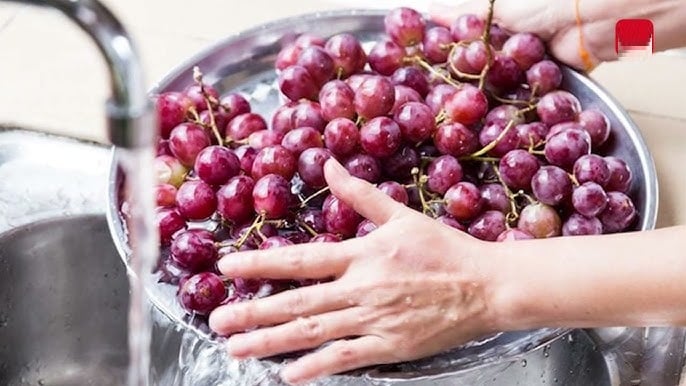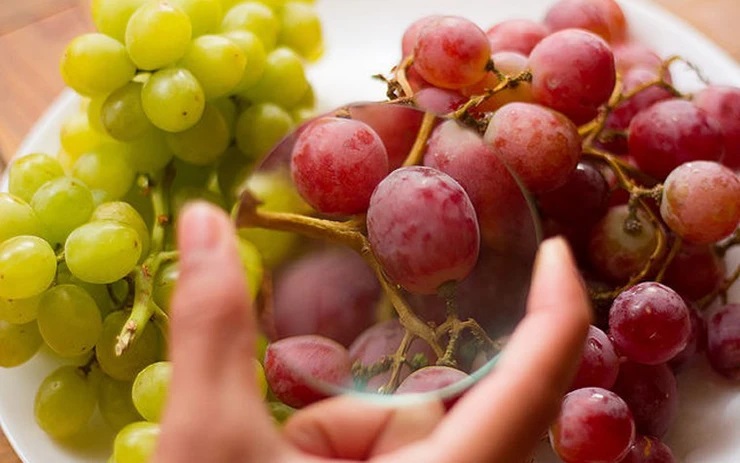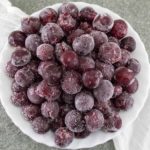## How to Properly Wash Grapes

Grapes Cleaning Tip
Washing grapes can be a bit tricky. Here’s a step-by-step guide to doing it right:
With a pair of scissors, carefully cut the grapes from the stem. This prevents any bacteria or dirt from the stem transferring to the grapes during washing, and also helps keep them fresh for longer.
Fill a clean basin with water and add a spoonful of salt to create a natural disinfectant that kills bacteria, insects, and their eggs that may be lurking on the surface of the grapes. Then, add a small amount of baking soda, a gentle, natural cleanser that will help remove any lingering pesticides and dirt.
The next step is to add a spoonful of flour to the mix. Flour is a great absorbent and will easily lift any stubborn dirt, especially the sticky residue that often clings to the grapes. Give it a gentle stir, then let it sit for about 10 minutes. This will give enough time for any tiny insects or larvae to rise to the surface, as they won’t be able to breathe.
After 10 minutes, you’ll see that most of the dirt and impurities have been drawn out. Now, gently rub the grapes with your hands to remove any remaining dirt. This process ensures that your grapes are safe and clean. Finally, rinse them under running water to wash away any remaining residue, and they’re ready to be enjoyed!
## An Alternative Method: Using Toothpaste
You can also wash grapes with toothpaste. Simply fill a basin with water, add your grapes, and then squeeze a small amount of toothpaste into the water. Gently rub the toothpaste onto the grapes with your hands, then rinse them thoroughly under running water.
Toothpaste can effectively clean the surface of the grapes and make them look brighter. Just make sure to properly rinse off all the toothpaste to avoid any soapy residue. Using a regular, mild toothpaste ensures that your grapes are free of chemicals and safe to eat.

Clean Grapes
## How to Choose the Best Grapes
When selecting grapes, there are a few key things to look out for:
**Appearance:** Fresh grapes have a delicate, white powdery coating on their surface. This natural protective layer helps retain moisture and keeps bacteria at bay. If the grapes are missing this coating, or if you spot any discoloration, cracks, or spots, it’s best to avoid them as they may be past their prime or damaged. Fresh grapes also have a bright color, while older grapes tend to look dull.
**Stem:** The stem of fresh grapes is always firm, crisp, and green. Older grapes will have dry, brittle stems that may turn yellow or brown. If there’s any looseness or gap between the stem and the fruit, it’s a sign that the grapes are losing moisture and are past their best. Any mold or insect spots on the stem are also a clear indication of spoilage or bacterial infection.
**Taste:** Fresh grapes should burst with sweetness and juice. If they taste sour or bland, they are likely old or unripe. Any unusual or bitter taste could also indicate the presence of pesticides or other contaminants, so it’s best to avoid consuming them.
The Ultimate Guide to Sparkling Clean Grapes
“For those who adore the tangy, sweet burst of flavor that fresh grapes offer, there’s often one nagging issue: the pesky layer of powdery residue that clings to their surface. It’s a tedious task to wash them thoroughly. But fear not, as baking soda is here to save the day and make your grape-washing woes a thing of the past.”


































